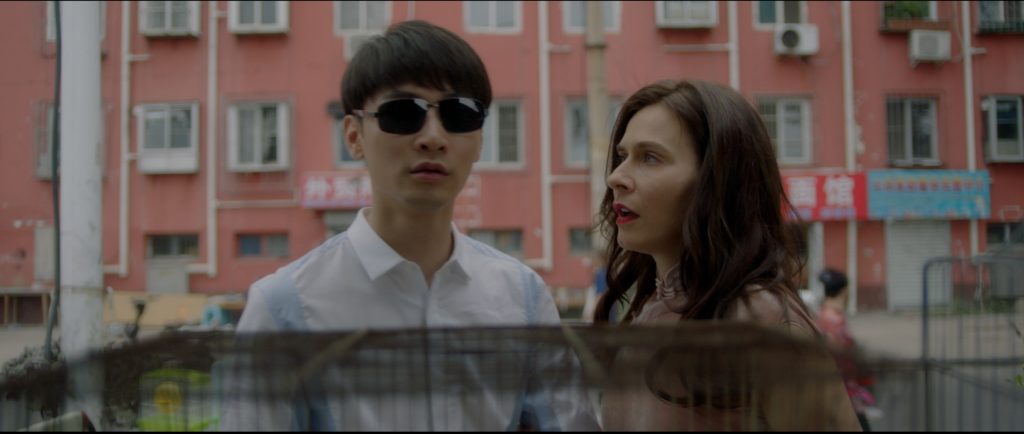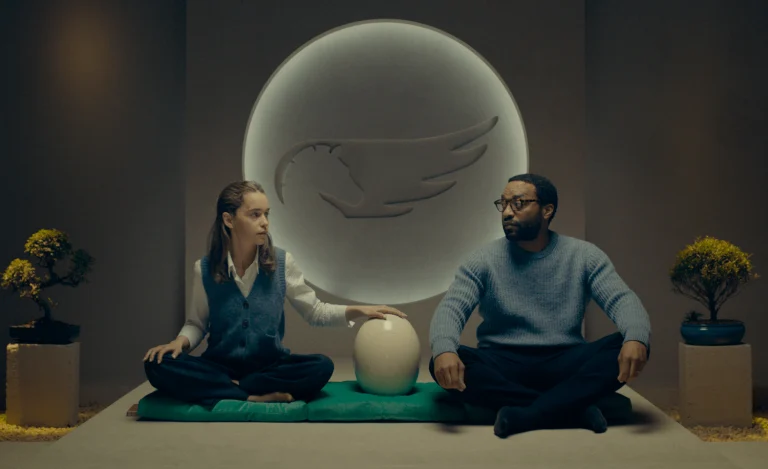“Touch” announces the arrival of a triple threat. Writer, director & actor Aleksandra Szczepanowska is and the only one who deserves to be applauded for the existence of this film. Though not entirely fulfilling after an exceptional first act, Szczepanowska’s film is irresistible for how it delves into desire and the need for something that truly belongs to you.
In the film’s opening scene we witness Fei Fei (Szczepanowska herself) at a local police station. She is frustrated and disheartened at the many hurdles she has to leap in order to get a permanent residency in China. As we draw closer to the proceedings, we see that Fei Fei isn’t actually Chinese. She is a caucasian woman who has married a Chinese man and is ready to accept the Chinese way of life. Basically, she wants to belong to this new country where she can live with her husband and a young son.
Related to Touch – Blind [2020] Review – A dull, insipid home invasion horror that’s hard to sit through
Accompanied by her not-so-interested husband Zhang Hua (Jun Yang), Fei Fei is especially alarmed because she has everything in place to be called a resident (working as a dance teacher to name one), and yet she is not allowed to be called one. There’s a restlessness in her voice; as if the need to belong is like gasping for the last straw out of a dozen. The restlessness also comes from being alienated – possibly because of trying to find a footing in a society so far removed from her existence that she is unable to feel at peace, or due to a husband who is least bothered in intervening with the process of her getting the said residency.
The relationship between the two of them feels pretty distraught. In spite of Fei Fei’s constant effort to gain his attention and love, Zhang Hua simply isn’t up for it. The director cleverly uses this angle to hint at Hua’s intentions and often lets the audience into a guessing game where they are constantly questioning both Hua and Fei Fei’s love and affection towards one another.
This alienation, due to the aforementioned reason has engulfed the woman in a kind of lonesomeness that is inclining her to desire a true connection. Enters Bai Yu (Yuan Jiangwei) – a stranger who stops in front of her while she is sitting alone on a park bench. Now, this might comes off like a really absurd plot progression when you see Fei Fei following this said stranger, but one has to understand this from her perspective. This is a beautiful woman who is in a state of mind where she feels invisible. Since her husband is really distinct and disinterested, this singular moment makes her feel something truly incredible.
Since she feels visible after a truly long time, her choice of following this stranger doesn’t seem out of place. Bai Yu, on the other hand, is a blind masseur. Him being approached by a woman; by the smell of it – a beautiful woman, kind of tingles his senses too. He is initially guarded and doesn’t indulge in Fei Fei’s advances, but since she keeps coming back, the desire in him also comes out. A sort of forbidden affair bubbles up between Fei Fei and Bai Yu. The kind where Fei Fei’s desires feel implicated in Bai Yu’s loving embrace and sensual touch.
Aleksandra Szczepanowska uses multiple lenses and image blurs to show us the real intensity and passion of this love affair. She never paints Fei Fei’s character with shades of grey and Bai Yu’s as one where you forcibly sympathize with. This provides the relationship with a kind of weary freedom, thus making the passion of the forbidden fruit taste sweet both for the two people and the audiences alike.
Also, Read – Hush [2016] Netflix Review: The deaf mouse Vs The wounded cat!
At this point in the runtime, director Szczepanowska’s approach takes a complete U-turn. I, for one, would have liked it better if she had explored this forbidden desire and Fei’s Fei’s need to truly belong in a more concise way. Instead, the film dives into paranoia and obsession; which, in spite of its familiarity, feels like a major shift. The film desperately moves into genre film territory and the character development feels like an oblique hyperbole that wasn’t needed in the first place.
The rest of the film kind of becomes like a seen before ‘cat-and-mouse’ game where the three principal characters and their actions are confused with reality and a figment of Fei Fei’s imagination. While technically, the film still remains pretty spot on, the narrative turn feels like a descend into something that doesn’t hold one’s attention. To add to that, Szczepanowska fails to balance this tonal shift and her film just comes off as a limping chore to the finish line. It is kinda disappointing because “Touch” starts off on a promising note and has all the ingredients of becomes a sensual drama about desire, longing, and the need to belong. However, certain choice never makes it what it could have been.






![The Peanut Butter Falcon [2019]: ‘BFI-LFF’ Review – A funfair Caterpillar ride](https://79468c92.delivery.rocketcdn.me/wp-content/uploads/2019/10/peanut-butter-falcon-review-768x512.jpg)


